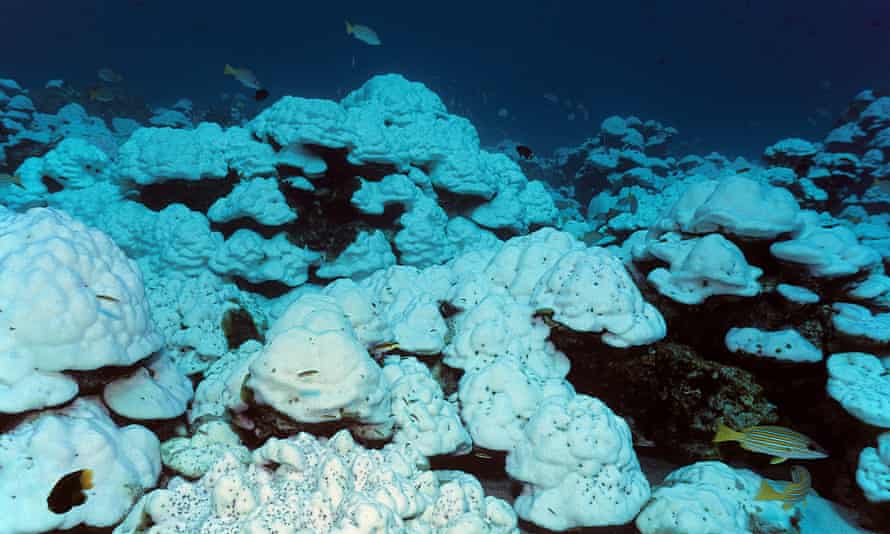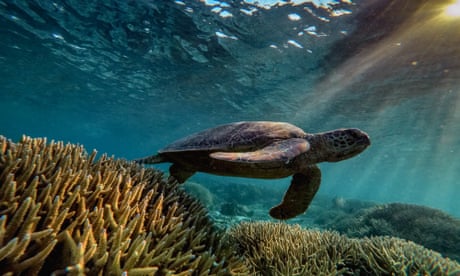Extract from The Guardian
Coalition’s Great Barrier Reef envoy also said Australia was a ‘victim of our own success’ when it came to coral bleaching.

The Coalition’s Great Barrier Reef envoy Warren Entsch says coral bleaching is caused by heated water that ‘comes from the northern hemisphere and turns right at about Chile and travels across the Pacific’.
Last modified on Fri 16 Jul 2021 04.21 AEST
Coral and ocean scientists have described statements on coral bleaching from the government’s reef envoy, Warren Entsch, as “far-fetched” and “ill-informed” on the day he accompanied more than a dozen ambassadors on a snorkelling trip to the Great Barrier Reef.
Entsch told the ABC on Thursday warm water originating in the northern hemisphere and flowing across the Pacific to the reef was a chief cause of mass coral bleaching.
He also claimed in the interview with ABC radio presenter Fran Kelly that attempts to clean up the water over the reef meant corals were more exposed to more sunlight, making bleaching worse.
Australia was a “victim of our own success”, he said.
Entsch hosted ambassadors from 14 countries for a snorkelling trip to Agincourt reef on Thursday with the government stating it would be “providing them with the facts” on reef challenges and successes.
He later told the Guardian the trip had gone “exceptionally well” and he rejected the criticism of his earlier comments.

“We showed them places where bleaching had happened, where a cyclone had been through and we showed them regrowth [of corals],” Entsch said. “They were amazed at the work we have been doing. They will be able to go back to their countries with first-hand knowledge and information from the world’s best reef scientists.”
The trip is part of the Morrison government’s intensive lobbying campaign to overturn a recommendation from Unesco that the world heritage committee should place the reef on its “in danger” list during a meeting next week.
The federal environment minister, Sussan Ley, is in Europe lobbying ambassadors and is due to return next week, with her schedule still being finalised.
The Guardian has revealed Australia has gained support from oil-rich Saudi Arabia and its Middle Eastern neighbour Bahrain to push the committee to delay any decision until at least 2023. Both nations are members of the 21-country committee, which includes Australia and is chaired by China.
Responding to a question about coral bleaching, Entsch told the ABC: “We have to manage these events even though the heated water actually comes from the northern hemisphere and turns right at about Chile and travels across the Pacific where it hits and is basically where the bleaching occurs.”
Unesco has told the world heritage committee that progress on reducing pollution levels across the reef is too slow.
The latest government report card on reef water quality, released in February, gave the health of the reef environment a “D” grade but said there had been moderate improvements in water quality.
Entsch told the ABC that work by the state and government authorities meant the water was “as clear as it’s ever been” and that on warm sunny days this allowed sunlight to penetrate “even deeper”. He suggested this was exacerbating bleaching.
Prof Ove Hoegh-Guldberg, a pioneer of coral bleaching science at the University of Queensland, said the idea water was “specifically coming from the northern hemisphere to bleach our Great Barrier Reef” was “pretty far-fetched.”
“The warmer than normal conditions that cause mass coral bleaching and mortality are driven primarily by global warming, which is due mostly to the burning of fossil fuels,” he said.
Hoegh-Guldberg said coral reefs around the world were suffering bleaching not just the Great Barrier Reef.
“This is the first time that I have heard of water quality being a problem,” he said. “Overall, these types of comments reveal we must do more to educate our leaders.”
Entsch has become a strong advocate for tackling climate change, saying the global pandemic should not be an excuse to slow down action but instead be seen as a reason to ramp up cuts to greenhouse gas emissions.
He has also said repeatedly that climate change is the biggest threat to the reef, putting his views in line with the government’s own science agencies.
But Prof Matthew England, a climate scientist at the University of New South Wales and an expert in ocean circulation, said his comments about ocean currents were “ill-informed”.
“What drives the bleaching is local atmospheric conditions,” he said.
“That is the air temperature that fluxes heat into the ocean. The frequency of these heatwaves has been increasing and we expect it to become unsustainable for most of the world’s reefs.”
Prof Nathan Bindoff, a leading oceanographer at the University of Tasmania, was also critical.
He said while large-scale ocean circulation did play a role in setting average temperatures around the world, “the evidence is also very clear that almost all of the changes in marine heatwaves that cause bleaching in coral reef systems, such as frequency, duration and intensity, are largely caused by the slow warming in sea-surface temperatures”.
Prof Terry Hughes, a coral expert at James Cook University, said heated water did not “come from the northern hemisphere, which of course experiences winter when temperatures are highest on the GBR”.
“Much of the heating is local, due to hot air temperatures and still conditions,” he said.
“There is no evidence that moderate improvements in water quality have made inshore reefs more susceptible to global warming. Reefs bleach when the temperature gets too hot. In all three bleaching events in 2016, 2017 and 2020, muddier inshore reefs were hotter and bleached more severely than offshore reefs.”
Associate Prof Tracy Ainsworth, a coral scientist at the UNSW, said: “Poor water quality reduces the fitness of the [coral] organisms, increases disease susceptibility, and increases susceptibility to heat stress. It is important to consider the fitness of organisms not just the impact to one factor in the environment, such as reducing light.”
Entsch rejected the criticisms and stood by his comments, saying he had been advised by experts at the Great Barrier Reef Marine Park Authority and the Australian Institute of Marine Science.
“That’s the advice,” he said. “I take the advice from people that I respect.”
No comments:
Post a Comment